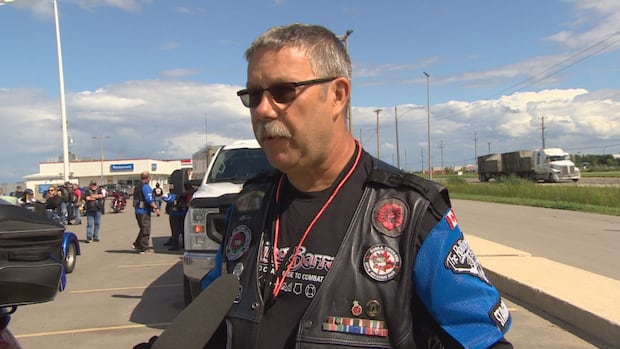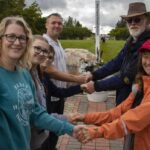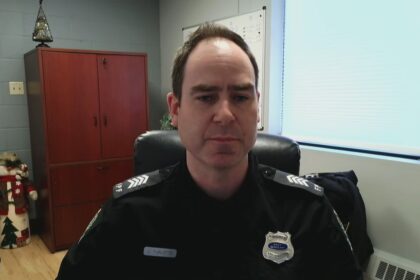ManitobaDozens of motorcycles rolled through Winnipeg on Saturday, as riders cross the country to raise awareness about Post Traumatic Stress Disorder. (PTSD)Annual Rolling Barrage sees motorcyclists drive cross-country to raise awareness about PTSDCBC News · Posted: Aug 10, 2025 9:50 AM EDT | Last Updated: 6 hours agoWarren Cave, a director of the Rolling Barrage PTSD Foundation, was one of dozens of motorcycle riders that cruised through Winnipeg on Saturday as part of Rolling Barrage, an annual cross-country motorcycle trip that looks to raise money and awareness for PTSD. (CBC News)Dozens of motorcycles rolled through Winnipeg on Saturday, as riders cross the country to raise awareness about Post Traumatic Stress Disorder. (PTSD)”We’re trying to fight the stigma, and make it a little easier for people to come forward and get some help when it’s needed,” Warren Cave, one of the directors of the Rolling Barrage PTSD Foundation said on Saturday.The Rolling Barrage is an annual cross-country motorcycle trip now in its ninth year. Motorcyclists ride over the course of approximately three weeks from St. John’s, N.L. to Aldergrove, B.C., and made a stop in Winnipeg on Saturday.On the journey, which also raises money for PTSD programming and supports, more than 40 motorcyclists cruised through downtown Winnipeg on Saturday afternoon, before ending their day in Neepawa. Cave, who lives in Alberta and spent years serving in the Canadian Armed Forces, said he knows how hard it can be for many who serve in uniform in different capacities to come forward when issues of mental health and PTSD surface, due to some of the things they see in the line of duty. Motorcyclists are riding from St. John’s to Aldergrove, BC in 21 days to raise awareness of PTSD. (Darin Morash/CBC)”We’ve got folks, whether it’s fire, ambulance, or police that have experienced some pretty traumatic events in their careers,” he said. He added he’s had his own struggles with PTSD, and found it difficult to reach out for help the first time he felt he needed it, a fear he says many share. Cave also said the ride is a chance for those who have dealt with trauma to meet people who have had similar experiences. “The ride itself is therapy for so many people,” he said. “You’re with a group of like-minded people that may have different experiences, but they’re similar. “Folks just talk and bond, and by the time this all ends, we’ve got a family, and that makes another network of people that can help each other.”Kevin Martin of Winnipeg, who spent years working as a paramedic, was part of the Rolling Barrage that made its way through Winnipeg on Saturday. He said in an email his years as a first responder in Winnipeg, and the things he experienced on the job, led to him being diagnosed with PTSD.”I spent years as a paramedic in Winnipeg — proud to serve, but carrying calls that stayed with me long after the sirens stopped,” Martin said. “Over time, those calls added up, and PTSD became a part of my life I couldn’t ignore.”For Martin, the Rolling Barrage symbolizes moving forward while living with PTSD. “Every stop is a reminder that none of us have to carry the weight alone, and that help is out there,” he said. “This ride is my way of taking back ground from PTSD, one kilometre at a time, and carrying that message from one side of the country to the other.”The Rolling Barrage will continue west on Sunday morning, and was expected to reach Saskatoon later in the day on Sunday, before continuing its journey west to B.C. With files from Gavin Axelrod
Thursday, 5 Feb 2026
Canada – The Illusion
Search
Have an existing account?
Sign In
© 2022 Foxiz News Network. Ruby Design Company. All Rights Reserved.
You May also Like
- More News:
- history
- Standing Bear Network
- John Gonzalez
- ᐊᔭᐦᑊ ayahp — It happened
- Creation
- Beneath the Water
- Olympic gold medal
- Jim Thorpe
- type O blood
- the bringer of life
- Raven
- Wás’agi
- NoiseCat
- 'Sugarcane'
- The rivers still sing
- ᑲᓂᐸᐏᐟ ᒪᐢᑿ
- ᐅᑳᐤ okâw — We remember
- ᐊᓂᓈᐯᐃᐧᐣ aninâpêwin — Truth
- This is what it means to be human.
- Nokoma










